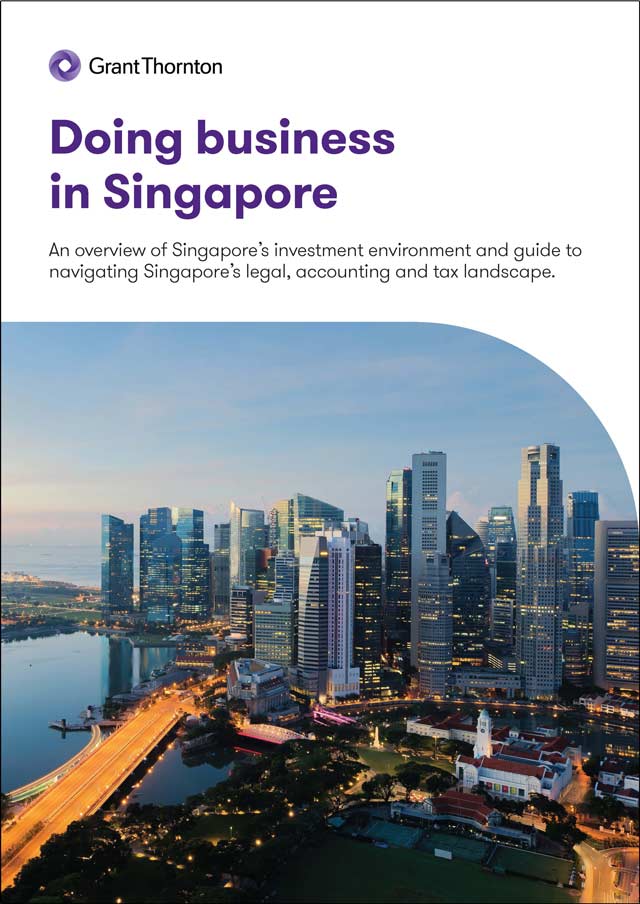
Corporate income tax in Singapore
Under the modified territorial basis of taxation, companies in Singapore are subject to tax on income accruing in or derived from Singapore and foreign income received or deemed received in Singapore from outside Singapore.

Rate
17%
ECI filing deadline
Within 3 months after financial year end
Tax return/computation/ (un)audited accounts deadline
30 November
Payment due date
Within 30 days from date of notice of assessment
Corporate income tax rate
The headline corporate income tax rate in Singapore is 17%.
Both resident and non-resident companies are subject to tax at the corporate tax rate after tax exemption as follows:
| Partial tax exemption | |
|---|---|
|
First $10,000 of chargeable income is 75% exempt
|
$7,500
|
|
Next $190,000 of chargeable income is 50% exempt
|
$190,000
|
|
Up to
|
$102,500
|
The partial tax exemption does not apply to:
- income that is subject to tax at concessionary tax rates
- income earned by a non-resident company that is subject to a final withholding tax
Qualifying start-up companies, with effect from YA 2020, are granted tax exemption for their normal chargeable income for their first three consecutive YAs as follows:
| Full tax exemption for new start-up companies | |
|---|---|
|
First $100,000 of chargeable income is 75% exempt
|
$75,000
|
|
Next $100,000 of chargeable income is 50% exempt
|
$50,000
|
|
Up to
|
$125,000
|
The conditions to qualify for the start-up exemption are that the company must be:
- Singapore incorporated
- a Singapore tax resident with no more than 20 shareholders where all shareholders are individuals or, at least one of the shareholders must be an individual who beneficially and directly owns at least 10% of the total number of issued ordinary shares.
Property developers and investment holding companies do not qualify for the start-up exemption.
Corporate income tax rebate
|
YA 2019
|
20% of tax payable, capped at $10,000
|
|
YA 2020
|
25% of tax payable, capped at $15,000
|
|
YA 2021-2023
|
NIL
|
|
YA 2024
|
50% of tax payable, capped at $40,000 less CIT Rebate Cash Grant of $2,000 where applicable CIT Rebate Cash Grant of $2,000 if the local employee condition is met |
Tax filings and due dates
An estimate of chargeable income (ECI) must be filed within three months from the end of a company’s financial year or accounting period. As a concession, companies with revenues of not more than SGD 5 million for the financial year and a nil ECI are not required to file an ECI.
The statutory deadline for filing corporate income tax returns is 30 November of the YA.
Income tax payable is due within 30 days from the date of the notice of assessment unless the IRAS has allowed the Company to pay the tax assessed by instalments. Instalment payments are generally allowed for companies that authorise a direct debit via the General Interbank Recurring Order (GIRO), for the payment of tax assessed on an ECI that has been lodged on a timely basis.
A late payment penalty of five percent of the tax due is applicable if the tax is not paid by the due date. A one percent additional penalty may be imposed if the tax remains unpaid 60 days after the imposition of the five percent penalty. The one percent additional penalty will be imposed for each completed month that the tax remains unpaid, up to a maximum of 12% of the unpaid tax.
Additional information
Foreign-sourced dividends, foreign branch profits and foreign-sourced service income received in Singapore by a Singapore resident company are exempt from income tax if the following conditions are met:
- the income is subject to some form of income tax in the foreign country
- the income is remitted from a country with a headline tax rate of not less than 15% the Comptroller of Income Tax is satisfied that the tax exemption would be beneficial to the Singapore resident company.
There is no capital gains tax in Singapore. However, the issue of the capital versus revenue divide has always been an area of contention with the Comptroller of Income Tax.
Under the group relief system, Singapore companies within the same group (the Group) are allowed to transfer current year tax losses, unabsorbed capital allowances and unabsorbed donations to another company in the same group.
A group consists of a Singapore incorporated parent company and all its qualifying Singapore incorporated companies.
Two Singapore incorporated companies are considered members of the same group if one is 75% owned by the other, or both are 75% owned by another Singapore incorporated company. The companies within the Group must have the same accounting period to qualify for the relief.
Subject to meeting the continuity of shareholding test (“the shareholding test”) and certain conditions, a company can deduct loss items against future income if it satisfies the shareholding test. The company is said to have satisfied the shareholding test when there is no substantial change (not more than a 50% change) in its shareholders and their shareholdings as at the relevant comparison dates.
All businesses will be allowed a one year carry-back of the qualifying deductions up to a cap of SGD 100,000 subject to meeting the requisite conditions. For YAs 2020 and 2021 only, the one year carry back condition has been enhanced to allow carry back to any of the last three years of assessment immediately preceding YAs 2020 and 2021.
Singapore has a one-tier corporate tax system. Under this system, corporate profits will be taxed only at the corporate level. Dividends paid by a Singapore company out of its corporate profits are tax exempt and are not subject to any withholding tax.
Singapore has an extensive range of tax incentives for businesses. These incentives, granted under the Economic Expansion Incentives (Relief from Income Tax) Act and specific provisions of the Singapore Income Tax Act, are administered by statutory boards such as the Economic Development Board (EDB), Enterprise Singapore, the Maritime and Port Authority of Singapore and the Monetary Authority of Singapore (MAS).
Capital allowances are given in place of book depreciation for fixed assets, whose cost is a non-deductible expense for income tax purposes. In addition, companies can claim writing-down allowances for capital expenditure incurred on acquiring certain intellectual property rights and qualifying indefensible rights of use assets.

Download the full PDF guide
Contact us


Subscribe for timely technical updates and keep on the pulse with industry developments
Related articles
View more



